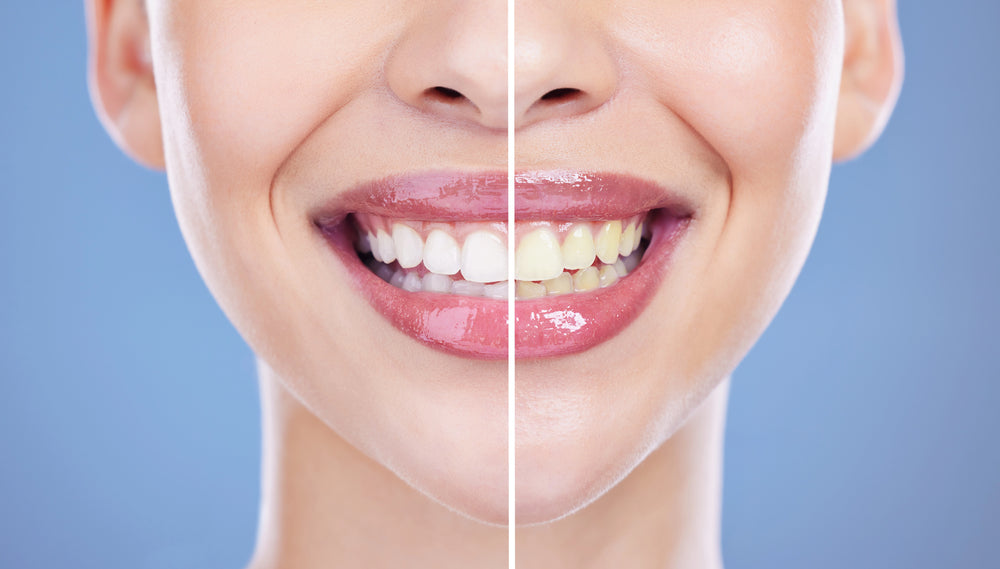
How to Keep Your Teeth White After Whitening Treatment
|
Time to read 5 min

|
Time to read 5 min
So, you’ve got your teeth whitening treatment? Congratulations on your newly brightened smile! Now, it's time to maintain those pearly whites and ensure your investment lasts. Knowing how to keep teeth white after professional whitening is the first step in maintaining them.
This blog discusses practical methods, such as proper dental cleanliness and nutritional concerns, to guarantee that your radiant smile lasts.
A beautiful smile is an attractive trait. Therefore, the desire to maintain the stunning results of the procedure is obvious. Here are some essential tips to help you extend the amazing effects of your whitening treatment:
You must adhere to a rigorous oral hygiene routine in order to keep your teeth white and healthy. This includes using specific products, brushing, and flossing.
Flossing prevents food particles and bacteria from becoming stuck between your teeth and causing discoloration and decay. Brushing gets rid of surface stains and plaque.
Being mindful of what you eat and drink after treatment is one of the most important ways to keep your smile white.
Foods to Eat After Teeth Whitening:
Apples, celery, cucumbers, and other fruits and vegetables with a high water content can be helpful because they help wash away plaque and food particles. Rich in calcium, dairy products like milk and yogurt can also aid in minimizing discoloration and strengthening enamel. When considering foods to eat after teeth whitening, it's best to stick to light-colored, non-acidic options like plain rice, pasta, bananas, and boiled potatoes, as they are less likely to stain your freshly whitened teeth and are gentle on the enamel.
Frequent Touch-Ups
It's common for your teeth to get less bright over time. As a result, getting touch-ups on a regular basis can help you keep your smile looking great.
By using at-home touch-up kits, you can keep your teeth whiter for three to six months longer.
You can maintain the best-looking smile by scheduling a professional appointment every six months.
Giving up smoking is essential to keep teeth white. Smoking raises the risk of gum disease and can result in poor breath and tooth discoloration. Furthermore, tar and nicotine can cause extreme discoloration, which makes it almost impossible to keep your teeth dazzling after teeth whitening.
Maintaining the health and beauty of your teeth is greatly aided by routine dental exams. They should ideally be scheduled every six months. Moreover, check-ups followed by professional cleanings can get rid of surface stains and tartar, making your smile look whiter.
Natural Ways to Help Keep the Whitening Effects Going
If you'd rather use natural therapies, there are a number of ways to keep teeth white while also improving your oral health.
Swishing oil—typically coconut oil—in your mouth for 15 to 20 minutes is known as oil pulling. This age-old method is thought to lessen oral microorganisms, maintaining a clean and radiant smile.
Baking soda and hydrogen peroxide can be combined to make a paste, which can be used as a mild natural whitening method. It’s essential not to use this too frequently - once a week should suffice. This combination can help remove surface stains without damaging your enamel.
Some fruits have mild abrasives in their peels that can be used to buff away surface stains. Because of their inherent qualities, rubbing the peels of bananas, oranges, or lemons against your teeth may help to brighten your smile.
However, if you leave the lemon's citric acid in your mouth for an extended time, it may erode your enamel, so be sure to rinse it thoroughly afterward.
As previously said, eating a diet high in fruits and vegetables is good for your oral hygiene and necessary for general health. In addition to providing nutrients that support healthy enamel, eating crunchy fruits and veggies can help naturally clean your teeth.
Many people promote activated charcoal as a natural teeth-whitening solution. Even while some people report results, it's best to use it sparingly and with caution. It is advisable to speak with a dentist before beginning this remedy because excessive use can cause enamel deterioration.
Following teeth whitening, maintaining a radiant smile requires a combination of preventive care, frequent touch-ups, attentive eating, and proper dental hygiene. By implementing the suggestions mentioned in this blog, you may maintain long-term dental health in addition to keeping your teeth white after professional whitening.
So, take charge of your oral health today and keep that smile shining bright!
Yes, if you address the root cause early, sensitivity can improve with proper care.
Absolutely! Ingredients like hydroxyapatite and calcium phosphate can rebuild enamel naturally without fluoride.


